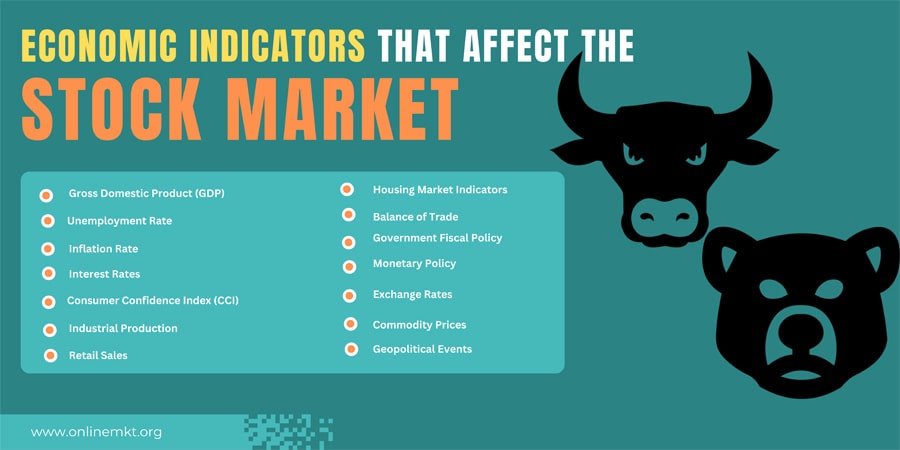Economic Indicators that Affect the Stock Market

The stock market seems like a mystery, but did you know a few key indicators can predict its ups and downs?
Stock markets change on a daily basis. They reflect the current state of the economy. Stock prices rise and fall with key economic indicators. This provides investors a big clue about overall health of the economy. Rational investors monitor these indicators for navigating the direction of the stock market.
GDP growth, employment figures, inflation, and consumer spending habits influence the most on a corporation’s earning and investor sentiment.
A healthy economy is characterized by a growing GDP, low unemployment, and steady spending by consumers. It means a good signs for stock market as well. However, higher interest rate, inflation, and lower consumers’ confidence cause stock performance down. Investors track these indicators to adjust their portfolios in anticipation of future markets.
Do not be a passive investor! Master these economic indicators to make rational investing decisions.
Gross Domestic Product (GDP)
It measures the sum total of goods and services manufactured over a particular time frame. A rising GDP suggests a healthy economy, which usually raises investors’ confidence and stock prices. However, a declining GDP tends to bring down stock prices.
Unemployment Rate
The percentage of the labor force that is unemployed and is willing to work. Even though high unemployment can signify economic distress and adversely affect stock prices, low rates of unemployment, in contrast, refer to healthy economies that increase stock prices.
Inflation Rate
It measures the rate at which general prices are rising for the goods and services. Moderate inflation is regarded as a normal part of a booming economy, but hyperinflation diminishes buying capacity and less benefit for the firm reduces stock prices. No inflation signals very weak demand tied with stagnation.
Interest Rates
The borrowed money rate is usually set up by a central bank of a country. When lending interest rates are reduced, it reduces what borrowers pay out for becoming indebted. This might trigger the rise in investments and consumer spending, thus increase stock prices. The opposite occurs if interest rates are raised.
Consumer Confidence Index (CCI)
Estimates how optimistic consumers are about the economy and their financial situation. High consumer confidence will usually mean that consumer spending increases, which drives economic growth, as much as it may increase stock prices. However, low consumer confidence will usually result in reduced spending as well as lower stock prices.
Industrial Production
It measures the output from the industrial sector: manufacturing, mining, and utilities. So, with increased industrial production, it usually means an improvement in the economy, which will also boost stock prices. A downtrend usually indicates economic trouble ahead.
Retail Sales
This number measures the total sales receipts of retail stores. High retail sales show consumer spending and are considered one of the fundamental drivers of the prosperous economy that can push stock prices upward. Conversely, a fall in retail sales can show the opposite.
Housing Market Indicators
A strong flourishing housing market will signal growth from the economy and bolster those related stocks (construction and home). A weak housing market would portend signs of economic difficulty.
Balance of Trade
A trade balance is the difference between exports and imports in a country. A trade surplus (exports are in greater proportion to imports) is considered generally good for an economy and the stock market, while trade deficit is the opposite.
Government Fiscal Policy
This means government spending, tax policy, and borrowing. An expansionary fiscal policy can urge an economy and boost the stock market by enhanced spending or a tax cut. The contrary may happen in case of contractionary policy, with reduced spending or tax increases.
Monetary Policy
Monetary policy is taken by a central bank to manage money supply and interest rates. Expansionary monetary policy (or lowering interest rates, quantitative easing) increases demand and thus increases stock prices, whereas contractionary policy (raised interest rates) causes decline in economic activity and disaffect stock prices.
Exchange Rates
The value of a country’s currency in relation to other country’s currency. A strong domestic currency will make life hard for exporters who, however, benefit importers and stock prices of these sectors. However, it does the opposite in the case of a weak currency.
Commodity Prices
Increasing commodity prices of essential goods such as oil, gold, and agricultural produces, increases costs for businesses, reducing profit margins, and affecting them adversely on their stock prices. On the contrary, prices falling would mean lower costs translating to higher profits.
Geopolitical Events
Elections, wars, and trade disputes are huge events that frequently affect the stock market. Generally, a stable geopolitical environment is favorable for the investor’s sentiment and stock prices, while instability would always bring in diverse market reactions, sometimes even declines.
Conclusion
A stock market is not only a place for exchanging stocks in between buyers and sellers but represents the general economic condition. The individual who is always in touch with the pulse of the economy could form an idea on the future of the market and make appropriate decisions to realize the economic goals they had set forth for themselves.
That is how the stock market become one of the most powerful tools an individual can use to create wealth. Understanding the fundamentals of what drives the economy and staying informed and flexible makes one able predict market accurately and earn massive amount from stock market.